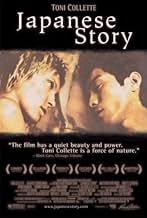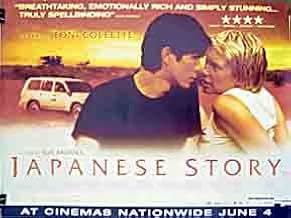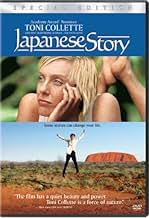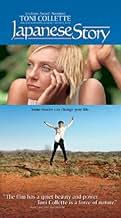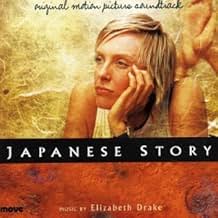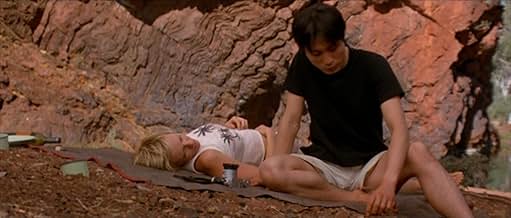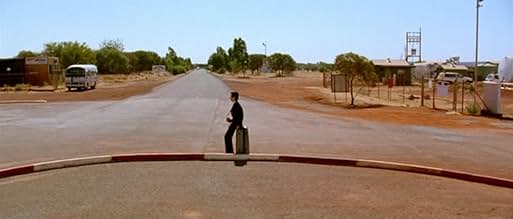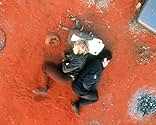IMDb RATING
6.8/10
6.9K
YOUR RATING
Against the background of an Australian desert, Sandy, a geologist, and Hiromitsu, a Japanese businessman, play out a story of human inconsequence in the face of the blistering universe. The... Read allAgainst the background of an Australian desert, Sandy, a geologist, and Hiromitsu, a Japanese businessman, play out a story of human inconsequence in the face of the blistering universe. The end of the journey leaves no one capable of going back to where they started from.Against the background of an Australian desert, Sandy, a geologist, and Hiromitsu, a Japanese businessman, play out a story of human inconsequence in the face of the blistering universe. The end of the journey leaves no one capable of going back to where they started from.
- Awards
- 20 wins & 13 nominations total
Jules Hutchinson
- Canteen Worker
- (as Jules Hutchison)
- Director
- Writer
- All cast & crew
- Production, box office & more at IMDbPro
Featured reviews
Spoilers - hopefully kept to a minimum, but you are duly warned !!
Thanks to the summary line 'The less you know about this film, the better', I curbed my urge to find out more about this film before watching it, something that I'm often tempted to do. If I had known the full plot, I would have been deprived of the dramatic experience of fully empathising with the emotions of the characters.
As others have said, this film is in three parts, call it three acts if you like plays or three movements if you like concertos. The first part is rather cliché, even banal, perhaps by intention. The scene of being stuck in the sand with the wheels spinning feverishly but going nowhere does strike a chord with those of us who have had similar experiences, on sand as well as on snow. The second part starts to intrigue and has all the necessary build-up. It's the third and final part, however, that has given me a cinematic experience that I've never had before. 'Powerful' will be an understatement. 'Powerful' however is not a fair description, because the word conjures up an image of being hit by an abrupt emotional blow. It's not quite like that. There's a sustained drive of waves of emotions, layer after layer. I know I'm getting myself into a lot of trouble saying this, but I think that it needs a woman director to pull this off. It also needs an actress in the caliber of Toni Colette.
Can't finish without mentioning the music. There are in fact a lot of scenes with absolutely no sound, not even the ambiance noise of the vast outback. But when there is music, they're the best. One good example is the love-making scene. But that is soon dwarfed compared with the hauntingly beautiful piece of music that is the background, sometimes just noticeable, sometimes coming forth, throughout the last twenty minutes of the film. Essentially, it alternates between a simple phrase of 8 notes on a plucked instrument and a haunting soprano chorus, blending in perfectly with the mood of the film.
Thanks to the summary line 'The less you know about this film, the better', I curbed my urge to find out more about this film before watching it, something that I'm often tempted to do. If I had known the full plot, I would have been deprived of the dramatic experience of fully empathising with the emotions of the characters.
As others have said, this film is in three parts, call it three acts if you like plays or three movements if you like concertos. The first part is rather cliché, even banal, perhaps by intention. The scene of being stuck in the sand with the wheels spinning feverishly but going nowhere does strike a chord with those of us who have had similar experiences, on sand as well as on snow. The second part starts to intrigue and has all the necessary build-up. It's the third and final part, however, that has given me a cinematic experience that I've never had before. 'Powerful' will be an understatement. 'Powerful' however is not a fair description, because the word conjures up an image of being hit by an abrupt emotional blow. It's not quite like that. There's a sustained drive of waves of emotions, layer after layer. I know I'm getting myself into a lot of trouble saying this, but I think that it needs a woman director to pull this off. It also needs an actress in the caliber of Toni Colette.
Can't finish without mentioning the music. There are in fact a lot of scenes with absolutely no sound, not even the ambiance noise of the vast outback. But when there is music, they're the best. One good example is the love-making scene. But that is soon dwarfed compared with the hauntingly beautiful piece of music that is the background, sometimes just noticeable, sometimes coming forth, throughout the last twenty minutes of the film. Essentially, it alternates between a simple phrase of 8 notes on a plucked instrument and a haunting soprano chorus, blending in perfectly with the mood of the film.
Australia has given the cinema some wonderfully adept and strikingly effective female actors in the past twenty years or so, Judy Davis starting a parade that includes Nicole Kidman, Cate Blanchett and Toni Collett among others. Collett has the ability to convincingly inhabit many different roles, her part as the depressed, suicidal mom in "About a Boy" being one of her most memorable.
"Japanese Story" is a quirky tale about Sandy Edwards, Collette, an Australian geologist in her, I would guess, mid-thirties. She's ordered to squire about the son of a Japanese industrialist whose investment in a major project is dearly desired by her bosses. The young man, handicapped by a very poor grasp of English and virtually none of Australian, is played by Gotaro Tsunashima. He might be well known in his native country but he was a new screen presence for me.
Sandy takes him on a tour of an achingly eerie, desolate, windswept part of Western Australia. Must of the movie was filmed in the Pilbara Desert, still aborigine country.
Sandy and her charge encounter adventurous situations while, no surprise, a romance springs up. Why Sandy would be attracted to the younger gentleman is never explained and it really shouldn't have been. "Japanese Story" asks the viewer to simply accept that liaisons arise without any deep preliminary exposition of character.
I won't reveal the plot, somewhat unexpected, but fate insures that this affair doesn't proceed swimmingly. What makes the movie is Collette's superb and affecting acting. I cared about her while knowing relatively little about her character's past life other than she hasn't completely resolved mom-daughter issues.
Nothing in this film could impel me to ever wish to go to the Pilbara Desert but it does excite my desire to see Collette take on many more challenging roles. She has a strong future-I hope.
8/10. See it if it plays near you, rent it later if not. You won't be sorry.
"Japanese Story" is a quirky tale about Sandy Edwards, Collette, an Australian geologist in her, I would guess, mid-thirties. She's ordered to squire about the son of a Japanese industrialist whose investment in a major project is dearly desired by her bosses. The young man, handicapped by a very poor grasp of English and virtually none of Australian, is played by Gotaro Tsunashima. He might be well known in his native country but he was a new screen presence for me.
Sandy takes him on a tour of an achingly eerie, desolate, windswept part of Western Australia. Must of the movie was filmed in the Pilbara Desert, still aborigine country.
Sandy and her charge encounter adventurous situations while, no surprise, a romance springs up. Why Sandy would be attracted to the younger gentleman is never explained and it really shouldn't have been. "Japanese Story" asks the viewer to simply accept that liaisons arise without any deep preliminary exposition of character.
I won't reveal the plot, somewhat unexpected, but fate insures that this affair doesn't proceed swimmingly. What makes the movie is Collette's superb and affecting acting. I cared about her while knowing relatively little about her character's past life other than she hasn't completely resolved mom-daughter issues.
Nothing in this film could impel me to ever wish to go to the Pilbara Desert but it does excite my desire to see Collette take on many more challenging roles. She has a strong future-I hope.
8/10. See it if it plays near you, rent it later if not. You won't be sorry.
8=G=
It would be impossible to say anything substantially meaningful about "Japanese Story" without spoiling the film for those who have not seen it. Suffice it to say, it's set in Australia and works with a an Aussie woman (Colette) and a Japanese man (Hiromitsu) to build slowly to an emotionally potent situation - a series of moments - and then lingers in the denouement allowing the audience to savor the emotions evoked. For some, those feelings may be nil. For others they may be powerful and overwhelming. Personally, I wept. Objectively, the film, about a woman by women, is well crafted and Colette's performance is outstanding. The film deserves high marks in all aspects from cinematography to music to casting, etc. However, when the closing credits roll, your experience will have been as unique as yourself. And whatever that experience is, it will be less if you know the outcome in advance. (B+)
10Adetunji
This is, apparently, a love it or hate it movie. As is the case with such films those on one side have a hard time understanding the view of the opposite. I am fully in that camp, I thought this film was stark and beautiful--as moving in its silence and mundane moments as it was illuminating. For those who say there is no plot, well I clearly saw a different film, there is more story and intention in simple small details as there are in a whole series of other films. Toni Collette was amazing and Gotaro Tsunashima was perfect, capturing the emotional compression and exploration of his character with clarity and skill. In a film full of striking absolutely believable and full moments -- the furtive exploratory glances as the two leads drive through the desert, and Toni's fascination with Gotaro's nearly hairless arms say so much about the characters', their history, their assumptions, their prejudices. Incredibly moving, shattering emotionally, and ultimately deeply profound. A haiku-like meditation on living and sharing--I loved it.
I think it's one of those memorable movies you'll think about for a long time, but it also seemed to go on for a long time while you're watching it. I think Americans aren't all that comfortable with the very leisurely pace of a lot of foreign films, and that may have been part of the problem -- but there's only so long you can watch someone expressing an emotion before you want to say "I get it, I get it -- can we move on to what happens next?" The plot involves a headstrong young Japanese businessman's visit to the most desolate part of Australia -- a rather tough geologist played by Toni Collette (Muriel's Wedding) is his tour guide. He doesn't quite understand how different Australia is from Japan, and Collette has her hands full trying to chauffeur him around. The movie centers around the relationship that develops between these two very different people, set in the mind-bogglingly desolate Australian outback.
If your idea of a great movie involves car chases, this is definitely not the movie for you. If you like slower and more nuanced movies, then this one is definitely worth seeing.
If your idea of a great movie involves car chases, this is definitely not the movie for you. If you like slower and more nuanced movies, then this one is definitely worth seeing.
Did you know
- GoofsWhen the QANTAS jet to Kyoto leaves, it is actually leaving from the Perth domestic airport. The international terminal, where it would really leave from, and the Darling Ranges to the east, are clearly visible in the background.
- Crazy creditsOur thanks to the people of Nyamal, Ngarluma, Yinjibarndi, Bunjima and Nyiparli Nations.
- ConnectionsFeatured in Inside Japanese Story: an evening with the film-makers (2004)
- SoundtracksABC News Theme
(1986)
Written by Tony Ansell (as T. Ansell) and Peter Wall (as P. Wall)
Published by ABC Music Publishing and
Kindly reproduced with the permission of the Australian Broadcasting Corporation
- How long is Japanese Story?Powered by Alexa
Details
- Release date
- Country of origin
- Official sites
- Languages
- Also known as
- Японская история
- Filming locations
- Production companies
- See more company credits at IMDbPro
Box office
- Budget
- $5,740,000 (estimated)
- Gross US & Canada
- $647,054
- Opening weekend US & Canada
- $23,962
- Jan 4, 2004
- Gross worldwide
- $4,098,613
- Runtime
- 1h 46m(106 min)
- Color
- Sound mix
- Aspect ratio
- 2.35 : 1
Contribute to this page
Suggest an edit or add missing content







